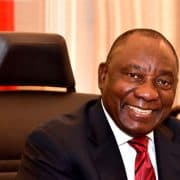|
Getting your Trinity Audio player ready...
|
The Constitutional Court ruled today on the United Democratic Movement’s (UDM) application for a secret ballot in the motion of no confidence against President Jacob Zuma. The court was asked to order that National Assembly Speaker Baleka Mbete must make all arrangements to ensure that the vote of no confidence takes place by secret ballot.
The court referred the matter back to Mbete. Mogoeng said that the speaker was mistaken when she said that she did not have the power to make such a directive, and that decision, made on 6 April 2017, was declared invalid and set aside. The notion that a no-confidence vote by secret ballot is not constitutionally permissible was incorrect, he said.
“It is [the speaker’s] judgement call to make,” said Chief Justice Mogoeng Mogoeng, reading a unanimous judgment. “The voting process must not be a fear-inspired sham, but a genuine effort to uphold accountability. Each member must be able to to do what would in reality advance the Constitution.”
The power that vests in the speaker to determine the voting procedure in a vote of no-confidence belongs to the people and must not be used arbitrarily or whimsically, he said. “Power cannot be used illegitimately or without regard to the circumstances that inform its use.”
The court made the following orders:
- The UDM was granted direct access to the Constitutional Court;
- The speaker has the constitutional power to prescribe that the no-confidence be conducted by secret ballot;
- The speaker’s decision of 6 April 2017, that she does not have the power to do so, is set aside;
- The UDM’s request is remitted to the speaker;
- The speaker and president must pay the costs of the applicants, including costs of two counsel.
Seeking justice for the people
In May the UDM approached the ConCourt with an application to force Mbete to conduct the vote of no confidence in Zuma by secret ballot. The party argued that a secret ballot would give MPs the confidence and security to act with integrity – something that all South Africans expect from their elected representatives.
The ConCourt agreed. “Those in Parliament have to ensure the will of the interest of the people finds expression in what the state does,” said Mogoeng. He added that the needs of the people must never be allowed to be neglected without consequences.
The UDM’s application arose from President Zuma’s controversial Cabinet reshuffle in March, in which former finance minister Pravin Gordhan, his deputy Mcebisi Jonas, and others were fired.
The opposition asked Mbete to schedule a vote of no confidence in Zuma, which was due to take place on 18 April, but was later postponed until after the court’s judgment was handed down.
In May ANC secretary-general Gwede Mantashe cautioned the party’s MPs to vote in line with the decision of the ANC caucus on the motion of no confidence in Zuma. The implication was that there would be repercussions if they did not.
“It is parties that the electorate votes for, and parties must be accountable to the electorate,” Mogoeng said. “Nowhere does the supreme law provide for members to pledge allegiance to their parties, and in the case of a conflict between the Constitution and party loyalty, the people’s best interest must prevail. A party’s unacceptable abandonment of its manifesto will likely result in electoral defeat.”








